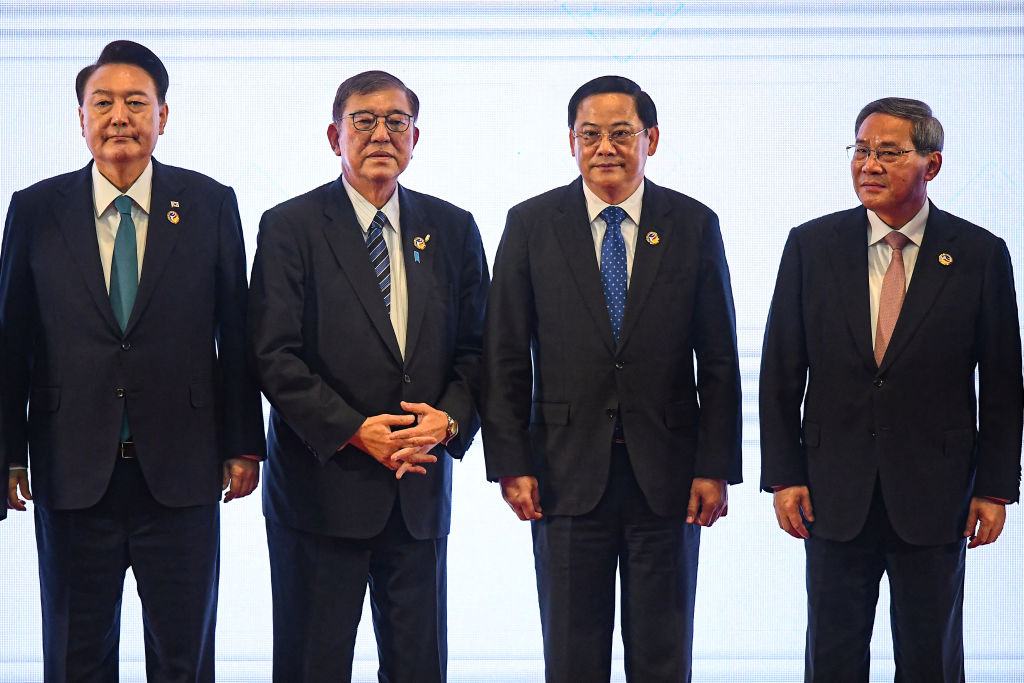The two leaders confirmed their commitment to promoting mutually beneficial ties to stabilize bilateral relations amid ongoing tensions.
Japan’s new Prime Minister Shigeru Ishiba met with Chinese Premier Li Qiang on the sidelines of the summit of Southeast Asian countries in Laos on Oct. 10, where Ishiba made his diplomatic debut.
The two leaders confirmed their commitment to promoting mutually beneficial ties to stabilize bilateral relations amid ongoing tensions, according to the Japanese Foreign Ministry (MOFA).
Regarding Taiwan, which Beijing claims to be part of its territory, Ishiba stated he is closely monitoring the cross-strait situation and said that peace and stability in the Taiwan Strait is important.
The two countries have seen increased tensions in recent months after incursions by Chinese military aircraft into Japanese airspace and the fatal stabbing of a Japanese schoolchild in Shenzhen.
The meeting was seen as a chance for Ishiba to showcase his diplomatic abilities before forming a new government. He dissolved Japan’s House of Representatives on Oct. 9 for a snap election on Oct. 27. The ruling Liberal Democratic Party (LDP), of which Ishiba was elected on Oct. 1 as the leader and, therefore, prime minister, will likely need to maintain a majority in the House with support of other political parties.
The handling of diplomatic relations with China has attracted significant attention from the Japanese business community.
In August, the Japanese Chamber of Commerce in China reported that 60 percent of Japanese companies felt the business environment had worsened, marking the third consecutive decline. Many cited uncertain economic prospects, fierce competition, and reduced profitability as reasons for scaling back or withdrawing investments.
Tetsuro Homma, chairman of the Chamber, urged the Chinese government to improve the operating environment for these companies.
The Chamber, on behalf of its members, has also called for reinstating visa-free entry for Japanese nationals and ensuring their safety. It has also highlighted that China’s anti-espionage laws have hindered business expansion.
On Aug. 21, an Astellas Pharma employee was indicted on suspicion of espionage. He had been detained since March 2023 after being arrested while heading to the airport to return to Japan. Details about the alleged crime, trial, or treatment of the employee remain unknown, creating a chilling effect on Japanese businesses operating in China.
On Oct. 4, the Japan Business Federation published its policy recommendations on international priorities, including maintaining a rule-based international economic order, ensuring fair trade, and strengthening collaboration with the Global South—a group of 70-plus developing countries largely located in the southern hemisphere—to foster a better business environment in those regions.
Since Japan and China normalized relations in 1972, Japanese businesses have invested heavily in China, building deep trade, production, and supply chain ties. China is Japan’s largest trading partner, with $300.7 billion in trade in 2023, though this was a 3.8 percent decline from the previous year, according to MOFA. Japan is China’s second-largest trading partner after the United States.
In 2023, Japan’s direct investment in China fell to $3.8 billion, down 64.1 percent from 2022, making Japan the 14th largest investor in China, according to MOFA.
Many Japanese companies have withdrawn from China, shifting production back to Japan or to other Southeast Asian countries such as Vietnam. According to Teikoku Databank, the number of Japanese enterprises in China fell by 9.4 percent from a peak of 14,394 in 2012 to about 13,034 today.
Companies that remain in China are more focused on managing political and economic risks than on talent acquisition or cultural challenges, according to a Teikoku Databank report released in August.
On Oct. 4, representatives from Japan’s major business organizations, including the Japan Business Federation (Keidanren) and the Japan Chamber of Commerce, met with Ishiba to share economic policy recommendations. They urged the government to boost wages and work with the private sector to expand domestic investment.
During a separate meeting on the sidelines of the Oct. 10 summit, Ishiba met with South Korean President Yoon Suk Yeol.
According to Yoon’s office, Ishiba noted that relations between their countries had greatly improved under his predecessor, Fumio Kishida, and Yoon, and expressed a desire to enhance them further.
“I hope we will promote the development of Korea-Japan relations through active and close communication,” Yoon said.
Japan, South Korea, and China are important trading partners of Southeast Asian countries but are not members of the Association of Southeast Asian Nations (ASEAN) bloc.

